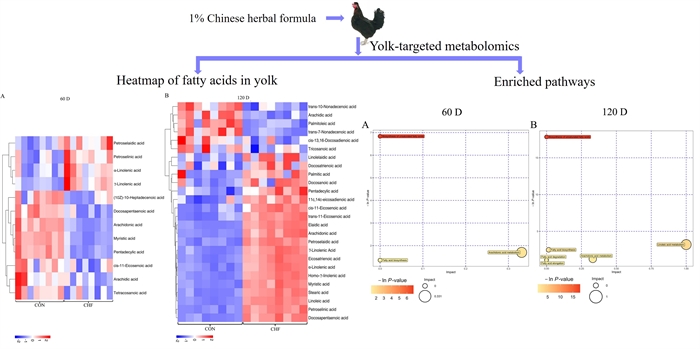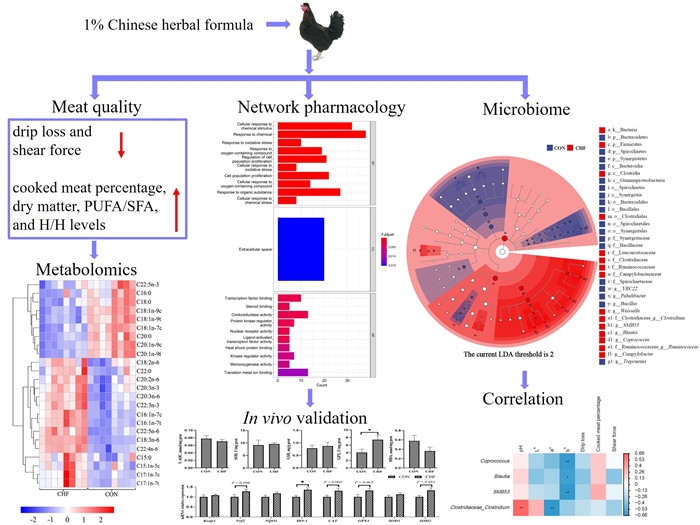Chinese Herbal Formula Ultra-fine Powder Enhances Egg and Meat Quality in Aged Laying Hens
Recently, a research team led by Prof. Kong Xiangfeng from the Institute of Subtropical Agriculture, Chinese Academy of Sciences, has revealed the mechanisms of dietary Chinese herbal formula ultra-fine powder (CHFUP) for improving egg and meat quality of aged laying hens.
Eggs are highly nutritious and serve as an excellent source of essential amino acids and fatty acids in daily diets. However, aged laying hens often develop metabolic disorders, including hepatic lipid accumulation, reduced antioxidant capacity, and impaired intestinal and reproductive health. The above issues lead to decreased egg production, inferior egg quality, and premature culling.
Aged laying hens contribute substantially to poultry meat production. Existing research on aged laying hens mainly focuses on improving muscle tenderness, yet nutritional value enhancement has gained little attention. Fully optimizing the economic utilization of aged laying hens is a pivotal challenge for the layer industry.
Chinese herbal formulas have been historically utilized in both human and animal nutrition. Ultra-grinding technology effectively breaks down herb cell walls, enhancing the bioavailability of bioactive constituents, improving feeding efficiency, and reducing dosage requirements. Consequently, dietary CHFUP supplementation demonstrates promising potential for enhancing physiological health and productive performance in aged laying hens.
Based on the “sovereign-minister-adjuvant-courier” formulation principle of traditional Chinese veterinary medicine, researchers developed two herbal formulas, including “Danshen (Salvia miltiorrhiza) + Nvzhenzi (Ligustrum lucidum) + Pugongying (Taraxacum mongolicum)” and “Yimucao (Leonurus japonicus) + Danshen + Nvzhenzi + Pugongying”. Therefore, diets containing 1% of these formulas were fed to 43-week-old Xinyang black-feathered laying hens for 120 days to elucidate the underlying mechanisms of CHFUP. Eggs and muscle samples were collected on days 60 and 120 of the trial, and integrated network pharmacology, targeted metabolome, and microbiome analysis to elucidate the beneficial effects and underlying mechanism of dietary CHFUP in improving the egg and meat quality of aged hens.
The findings are as follows: 1) Laying rate and polyunsaturated fatty acid (PUFA) content in egg yolk (including linolenic acid, linoleic acid, arachidonic acid, and docosapentaenoic acid) were increased, and yolk lipid health indices were improved. 2) Meat quality was improved by reducing breast muscle drip loss, b* value (yellowness), and shear force while increasing cooked meat yield and dry matter content; PUFA levels, PUFA/saturated fatty acid ratio, hypocholesterolemic/hypercholesterolemic ratio, and total essential amino acids were enhanced in breast muscle.
“Our findings provide a green, efficient, and residue-free nutritional strategy to improve late-phase egg production, extend the laying cycle, and enhance egg and meat quality.” said Prof. Kong XiangFeng, the corresponding author of this study, “which will provide a potential framework for sustainable poultry production.”
Contact: Kong XiangFeng
E-mail: nnkxf@isa.ac.cn

Dietary Chinese herbal formula supplementation improves yolk fatty acid profile in aged laying hens. (Image by Li Zhihua)

Metabolomics, network pharmacology, and microbiome analyses reveal the mechanism of the Chinese herbal formula improving the meat quality of laying hens. (Image by Li Zhihua)
Download attachments: